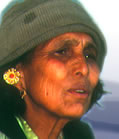THEMES IN THIS
TESTIMONY
Economics

Gender

Identity

Social Relationships

Click on arrows
to find more
testimonies
featuring
these themes
|
|
Sex
|
Female
|
|
|
Age
|
28
|
|
|
Identity
|
Kami
|
|
|
Occupation
|
farmer/trader
|
|
|
Location
|
Krishnapur-7, Chitwan district
|
|
|
Date
|
2002
|
|
summary
Unfortunately this interview both starts and ends rather abruptly. However, it contains lots of excellent material on caste systems and prejudice, and gender (male and female attitudes to caste, women’s efforts to gain some economic independence through savings groups). The interviewer plunges straight in with a question about caste problems in the women’s savings group and this remains the focus throughout.
Bimala explains that when the group was first set up and numbers were small there was no real problem of discrimination. In fact it seems that upper caste women overcame the lower caste women’s initial resistance, promising them support and persuading them they should all form one group. But as the group expanded, the Bahuns (Brahmins) and Chettri started “practising untouchability” towards the other women and refusing to eat food they had touched. After a while, they expelled them – without, it seems, repaying their contributions (“they grabbed the shares”). Bimala’s own business venture also foundered on the practice of untouchability. She borrowed from the group and started a small shop in the village but was forced to close when people started boycotting it, on the basis that her Kami (blacksmith) caste status meant the shop food was “polluted”.
What is interesting is Bimala’s awareness of the range of issues involved. She implies that it is contradictory for women, who suffer discrimination because of their sex, to discriminate themselves against other women. “Our Bahun, Chettri women simply do not realise that as women themselves they should not look down on other women and make them feel small.” She is also conscious of the risks of angering the husbands and male relatives of high-caste women, who have prestige and power (easily used against the less powerful). Fundamentally what she wants to see is attitudinal change and says she is very willing to forgive her sisters. For this reason, and because she recognises the interdependency of people within society (“tomorrow we may need that same society”) she and the other victims of discrimination have held back from filing a complaint. However, she says, “In future if this happens we will not tolerate it, this is what we have been thinking.”
She sees very clearly that “women’s development” means little while this deep-rooted caste prejudice persists: “When you look from the outside you see women’s groups being formed from village to village, you hear of women’s development. But who will understand the internal problems of this nature?” Her strength of feeling – and frustration at the slowness of change - is evident: “Even after listening to the radio, watching TV so often, it is not known why they have not been able to change even in this age and time. We have learnt a lot from TV and radio… Now we have known that we are despised and suppressed. The oppression is too much, some day we are going to fight them.” One lasting benefit from the group is the confidence it has given women to speak out. Bimala’s testimony with its full and articulate answers demonstrates this point very clearly.
detailed breakdown
|
You will need a password from Panos to view the full
transcript of the interview. To apply for a password, click here.
Once you have a password, click here to go to the beginning
of the transcript. You can also click on any section of the
breakdown of content below and go straight to the
corresponding part of the transcript.
|
| Section 1 |
When the women’s savings group was formed upper caste women were prepared to participate with lower caste members. As numbers grew they started discriminating against them, and then expelled them.
Asked about her feelings she says, “After all we, too, are human beings …We sat together in the group like sisters. Together we collected money and ran things. We grew up together from childhood, isn’t it? We all used to have fun and play around, got along well… But today…they get up and walk away if they have to eat food touched by us. Today, we have realised just how backward we have been and it has hurt us a lot.”
|
| Section Section 2 |
“Practising untouchability” is illegal and punishable by fines. She says the police do take action on this issue - “But why lodge complaints to the police on such matter, we think, and we keep quiet.”
The high-caste women’s husbands and male relatives “have prestige”, which inhibits the low caste women from filing complaints. “Moreover, tomorrow we may need that same society…” But is now thinking they have held back long enough and should file a complaint.
They have formed another group that operates clandestinely. Includes some Bahun and Chettri women, who still won’t eat anything touched by the ‘low caste’ women. Only one Bahun woman (see Nepal 27) treats them as equals: “What we need is a person like elder sister Bhagawati. Though a Bahun she does not practise untouchability.”
|
| Section Section 3-4 |
How the group has helped them, especially confidence-building. Before, “I didn’t have the capacity to talk like now”; today, women are able to talk to male staff (“sirs”) from other organisations, for instance.
Personal details – children; her brief education (to class five); her parents’ move; husband works in town and is not educated.
Describes prejudice towards Kami (blacksmiths, iron workers), her family’s occupational caste. Recalls incident of discrimination against father in restaurant. Says ruefully, “I have been seeing and hearing this from the time I was 10, 12 years old.”
Separate wells for lower castes: “Forget the past; it is still like that now. If you touch their well, they come charging [towards us] to beat us.”
|
| Section Section 4-6 |
Government campaign against caste discrimination uses radio and TV. Her children are taunted by other children and adults: “I cannot tolerate upper castes despising my child and other oppressed ones.”
Standing up to upper caste “bullying” women in saving’s group: “I also said ‘Why should I shift? I will not get up and go. If you fear being touched, then you pick up that chair and go to the roadside’.”
How group was run; size of savings; how people used savings. She borrowed Rs 10,000 from the group and started a small shop but some people influenced her own group members (28 families) to stop buying food from her - an “untouchable”. Eventually she had to close the shop.
|
| Section Section 6-7 |
Points out that these women didn’t think it through properly as, being members of the same group, her shop’s failure affected everyone.
Reflects on discrimination within the group. “The reason for opening the group is to co-exist, for all sisters to be united, and this was why all are in the group… But this thinking did not come to the women of the group. Even before joining the group, while going together to do farm work they gave us food separately, without touching us, and that really hurt my feelings. I used to feel like saying, ‘Why are you doing this?’ But I could not speak out at that time. When the village sisters together formed the group there was hope that such things would not happen but here things have got worse.”
|
| Section Section 7-8 |
Went on picnics organised by women's group but they weren’t allowed to touch any food all day. “I went to the picnics expecting laughter and merrymaking but it was just the opposite and I felt like crying.” Part of the problem for “BK” (Kami) women is that they are a small minority in the area. Prejudice is also fuelled by fear on the part of higher castes: “It is a practice from the time of our ancestors that higher castes have not allowed our caste to progress. If we move forward we will bully them, that’s what they think - and that is why they have always to be ahead.”
|
| Section Section 8-10 |
High castes fear that lower castes will stop short of nothing in their demands – including intermarriage: “But we have not asked to be allowed to do that. What we have said is whatever rights Bahun and Chettri women are getting, we should get those, too, that’s all we have said. Places where they walk, we should be allowed to walk also; like they don’t allow us to worship in temples where they worship.”
New temple being constructed locally but BK people are excluded, their donations refused. Municipality has also contributed, so, she says: “The moment the Municipality’s money is put [in] there we have our claim.”
Recognises gender differences vis-à-vis caste: “Our males are less bothered about this matter. They go out and their Bahun, Chettri male friends don’t resort to that much untouchability (discrimination). But women are far behind when it comes to untouchability and talking.”
Says she didn’t know about NGOs formed to fight such discrimination, such as the Oppressed Women’s Organisation.
Acknowledges that untouchability among oppressed castes themselves still practiced a bit among the older generation, but deplores it.
|
| Section Section 10-11 |
Two high-caste women support them. “They are also our own sisters.”
Constant fear that her own small children may break untouchability rules and be penalised. Feels education is the key to change.
|
| Section Section 11-13 |
Changes in clothes and food habits: “The oppressed castes were not very aware of cleanliness before. Now it’s not like that.”
Now sells vegetables in the market but not yet profitable. Husband helps. He used to drink a lot and beat her. “But now he does not do that and treats me well.” Wants to take up tailoring/weaving but needs more training. |
|


